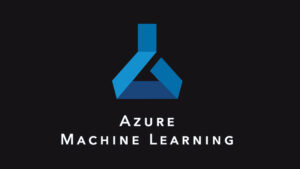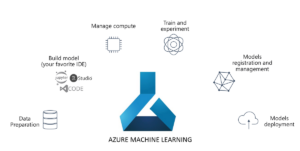Microsoft Azure Machine Learning

The Microsoft Azure Machine Learning: Empowering Organizations with AI-Driven Insights:
Microsoft Azure Machine Learning: In the age of big data, organizations are increasingly turning to artificial intelligence (AI) and machine learning (ML) to gain insights, improve efficiency, and drive innovation. Microsoft Azure Machine Learning (Azure ML) is a powerful cloud-based platform that provides a comprehensive suite of tools and services designed to simplify the process of building, training, and deploying machine learning models at scale. Whether you are a data scientist, developer, or business analyst, Azure ML equips you with the capabilities to leverage machine learning to solve real-world problems.
In this article, we will explore the key features of Microsoft Azure Machine Learning, its benefits, and how it is transforming the way organizations harness AI for various applications.
What is Microsoft Azure Machine Learning?
Microsoft Azure Machine Learning is a cloud-based platform that provides a robust environment for developing, training, and deploying machine learning models. It supports a variety of machine learning frameworks, programming languages, and tools, making it suitable for users of all skill levels. Azure ML facilitates the entire machine learning lifecycle, from data preparation and model training to deployment and monitoring.
Key Features of Azure Machine Learning:

-
Integrated Development Environment
- Azure ML offers an integrated development environment (IDE) that supports both code-first and low-code approaches. Users can choose to write code in popular languages such as Python and R or utilize the visual designer to create models using drag-and-drop functionalities. This flexibility allows data scientists and business analysts to work collaboratively and choose the development style that best suits their expertise.
-
Automated Machine Learning (AutoML)
- One of the standout features of Azure ML is its Automated Machine Learning (AutoML) capabilities. AutoML streamlines the model development process by automatically selecting the best algorithms and hyperparameters based on the provided dataset. Users can simply upload their data and let AutoML handle the rest, making it easier for non-experts to create high-quality models without needing extensive knowledge of machine learning.
-
Support for Popular Frameworks and Libraries
- Azure ML supports a wide range of machine learning frameworks and libraries, including TensorFlow, PyTorch, scikit-learn, and XGBoost. This compatibility allows users to leverage their preferred tools and existing code, facilitating the integration of Azure ML into their workflows. Additionally, Azure ML provides pre-built models and templates that can be customized to accelerate development..
-
Model Training and Optimization
- Azure ML supports distributed training, allowing users to train models on large datasets across multiple compute resources. This capability is particularly beneficial for deep learning tasks that require substantial computational power. Azure ML also provides hyperparameter tuning tools to optimize model performance further. Users can experiment with different configurations and monitor performance metrics to find the best settings for their models.
-
Deployment and Scaling
- Once a model is trained, Azure ML simplifies the deployment process. Users can deploy their models as web services or integrate them into applications using Azure Kubernetes Service (AKS) or Azure Container Instances (ACI). This deployment flexibility allows organizations to scale their models based on demand and ensure high availability for production environments. Additionally, Azure ML supports real-time and batch inferencing, catering to various use cases.
-
Monitoring and Management
- Azure ML provides tools for monitoring model performance in real-time, enabling users to track metrics such as accuracy, latency, and resource utilization. This monitoring capability helps organizations identify issues early and make data-driven decisions to optimize their models. Users can also set up alerts for specific performance thresholds, ensuring proactive management of their machine learning solutions.
-
Collaboration and Governance
- Collaboration is essential in data science projects, and Azure ML offers features to facilitate teamwork. Users can share workspaces, datasets, and models with colleagues, enabling effective collaboration across data science teams. Azure ML also provides governance tools that allow organizations to manage permissions, track changes, and ensure compliance with data protection regulations.
Benefits of Microsoft Azure Machine Learning:
- Scalability and Flexibility
Azure ML is designed to scale effortlessly, allowing organizations to handle varying workloads without compromising performance. Users can easily provision additional compute resources as needed, ensuring that their machine learning projects can grow with their data and business requirements. - Accessibility for All Skill Levels
With its combination of code-first and low-code tools, Azure ML caters to users with diverse skill sets. Data scientists can leverage advanced coding capabilities, while business analysts can create models using the visual designer, enabling collaboration and innovation across teams. - Accelerated Model Development
Azure ML’s AutoML feature and pre-built templates significantly reduce the time required to develop machine learning models. Users can quickly prototype, test, and deploy solutions, allowing organizations to respond faster to market changes and customer demands. - Cost-Effective
By leveraging the cloud infrastructure of Azure, organizations can reduce their upfront investment in hardware and software. Azure ML operates on a pay-as-you-go model, allowing businesses to scale their usage based on actual needs and manage costs effectively. - Integration with Microsoft Ecosystem
Azure ML seamlessly integrates with other Microsoft products and services, including Microsoft Power BI, Azure DevOps, and Microsoft Teams. This integration enhances productivity and collaboration, allowing organizations to leverage existing tools while building their machine learning capabilities.
Use Cases for Microsoft Azure Machine Learning:
Microsoft Azure Machine Learning is being utilized across various industries and applications, demonstrating its versatility and effectiveness:
- Healthcare: In healthcare, Azure ML is used for predictive analytics, patient outcome prediction, and drug discovery.
- Finance: Financial institutions leverage Azure ML for risk assessment, fraud detection, and customer segmentation.
- Retail: Retailers employ Azure ML for demand forecasting, inventory management, and personalized recommendations. By predicting customer preferences and optimizing stock levels, businesses can improve customer satisfaction and reduce operational costs.
- Manufacturing: In manufacturing, Azure ML is used for predictive maintenance and quality control. By monitoring equipment performance and analyzing production data, organizations can predict failures, reduce downtime, and enhance product quality.
- Marketing: Marketers utilize Azure ML for sentiment analysis, customer targeting, and campaign optimization. By analyzing social media data and customer feedback, businesses can tailor their marketing strategies to improve engagement and conversion rates.
Conclusion:
As organizations increasingly recognize the value of data-driven insights, Azure ML stands out as a critical tool for democratizing access to machine learning. By making AI accessible to users with varying skill levels, Azure ML empowers organizations to leverage machine learning for a wide range of applications, from predictive analytics to real-time decision-making.
